George Floyd protests: are journalists being targeted by police at US riots?
Members of media attacked by law enforcement officers in at least 50 separate incidents
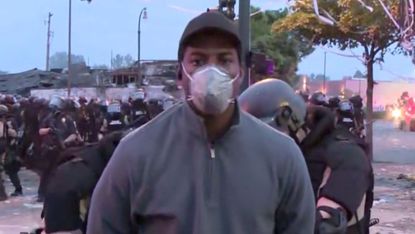
US police have been accused of repeatedly targeting journalists reporting at demonstrations across the US over the killing of African-American George Floyd.
The most high-profile incidents include the arrest of a CNN crew led by reporter Omar Jimenez while broadcasting live on air in Minneapolis on 29 May - four days after Floyd’s death at the hands of a police officer was caught on camera in the Minnesota city.
Dozens of other journalists have also been harassed or assaulted by police in other US cities, with some reporters apparently “swept up in indiscriminate efforts by authorities to disperse crowds”, says The Washington Post. “But in a number of incidents, journalists were injured, harassed or arrested even after identifying themselves as reporters.”
Subscribe to The Week
Escape your echo chamber. Get the facts behind the news, plus analysis from multiple perspectives.

Sign up for The Week's Free Newsletters
From our morning news briefing to a weekly Good News Newsletter, get the best of The Week delivered directly to your inbox.
From our morning news briefing to a weekly Good News Newsletter, get the best of The Week delivered directly to your inbox.
Indeed, members of the media have been attacked by law enforcement officers in at least 50 separate incidents since the protests began, according to investigative journalism website Bellingcat.
“In these examples, journalists have been shot with rubber bullets, targeted with stun grenades, tear gassed, physically attacked, pepper sprayed and arrested,” says the website.
Other sources claim the number of incidents is far higher, with the US Press Freedom Tracker tweeting that “we’re now investigating over **100** press freedom violations at the many #GeorgeFloyd protests around the country”.
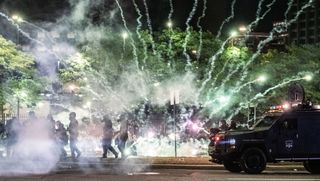
Are journalists being deliberately targeted?
Whether the attacks and arrests are intentional or simply part of a vigorous crackdown on protesters remains unclear.
According to The New York Times, some people in the media think the violence by police is a by-product of Donald Trump’s attacks on the press throughout his presidency.
“Many reporters, photographers and press advocates said the treatment of journalists by police officers in recent days reflected an erosion of trust in the news media that has seeped into law enforcement under President Trump, who has deemed critical coverage of his administration ‘fake news’ and has frequently labelled some news organisations and journalists with variants of the phrase ‘enemies of the people’,” the paper reports.
The Poynter Institute for Media Studies agrees, arguing that “attacks on media covering the protests are simply following the president’s rhetoric”.
–––––––––––––––––––––––––––––––For a round-up of the most important stories from around the world - and a concise, refreshing and balanced take on the week’s news agenda - try The Week magazine. Start your trial subscription today–––––––––––––––––––––––––––––––
And the impact?
Regardless of the intent behind such incidents, “they have the effect of impeding the news - hampering the public’s ability to see and judge the behaviour of officials who are accountable to them”, says The Independent.
“Journalists are there as representatives of the public, and if law enforcement is attacking them, they can’t do their job, and that hurts everybody,” Sarah Matthews, a staff attorney for the Reporters Committee for Freedom of the Press, told The New York Times.
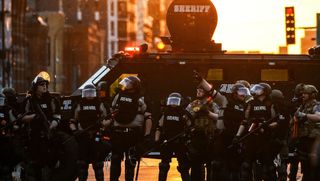
What happens next?
In an open letter to police, media groups including the Society of Professional Journalists, Reporters Without Borders and the National Press Club have called on law enforcement officers to end violence against journalists.
“You must persuade your colleagues, commanders and chiefs, and the mayors and governors who direct them, to halt the deliberate and devastating targeting of journalists in the field,” the letter says.
Attacks such as the ones witnessed over the past seven days will keep happening unless the public is made aware of them, according to Francine Prose, former president of the Pen America writers’ association.
“We can’t stop paying attention and, more important, calling attention to the importance of the free press and to the horrors of racism,” Prose says in an article for The Guardian. “The mistake was always to think that it can’t happen here, because it can, it has and – unless we remain aware and vocal – it most certainly will again.”
Create an account with the same email registered to your subscription to unlock access.
Sign up for Today's Best Articles in your inbox
A free daily email with the biggest news stories of the day – and the best features from TheWeek.com
-
 The week's best photos
The week's best photosIn Pictures A flooded island, a ballistic missile, and more
By Anahi Valenzuela, The Week US Published
-
 Who actually needs life insurance?
Who actually needs life insurance?The Explainer If you have kids or are worried about passing on debt, the added security may be worth it
By Becca Stanek, The Week US Published
-
 Sexual wellness trends to know, from products and therapies to retreats and hotels
Sexual wellness trends to know, from products and therapies to retreats and hotelsThe Week Recommends Talking about pleasure and sexual health is becoming less taboo
By Theara Coleman, The Week US Published
-
 Substack's moderation crisis: the revolt over 'Nazi newsletters'
Substack's moderation crisis: the revolt over 'Nazi newsletters'Talking Point Platform facing 'greatest crisis in its short history' amid writer exodus over hate speech vs. free speech debate
By The Week UK Published
-
 The most memorable newspaper front pages of 2023
The most memorable newspaper front pages of 2023In Depth From resignations and Covid revelations to Hamas's deadly attack
By The Week UK Published
-
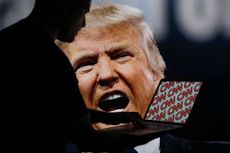 CNN in crisis
CNN in crisisSpeed Read Hemorrhaging viewers post-Trump, CNN is trying to broaden its appeal. Can it get Republicans to tune in?
By The Week Staff Published
-
 What the demise of Buzzfeed News tells us about the future of digital journalism
What the demise of Buzzfeed News tells us about the future of digital journalismfeature Closure of news division provides sobering reminder of struggles to find a sustainable business model for online media
By The Week Staff Published
-
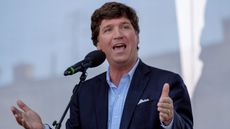 Fox News: the high price of peddling lies
Fox News: the high price of peddling liesIn Depth Murdoch is ‘unlikely to change his ways’ despite record settlement
By The Week Staff Published
-
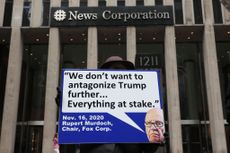 Judge delays Fox News-Dominion defamation trial start, reportedly to allow settlement talks
Judge delays Fox News-Dominion defamation trial start, reportedly to allow settlement talksSpeed Read
By Peter Weber Published
-
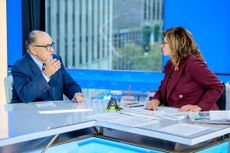 Fox News seeks gag order for producer who claims she was coerced to mislead in Dominion deposition
Fox News seeks gag order for producer who claims she was coerced to mislead in Dominion depositionSpeed Read
By Peter Weber Published
-
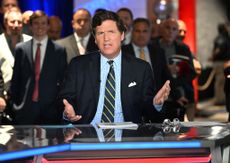 Lawsuit documents: After 2020 election, Tucker Carlson said he hates Trump 'passionately'
Lawsuit documents: After 2020 election, Tucker Carlson said he hates Trump 'passionately'Speed Read
By Catherine Garcia Published